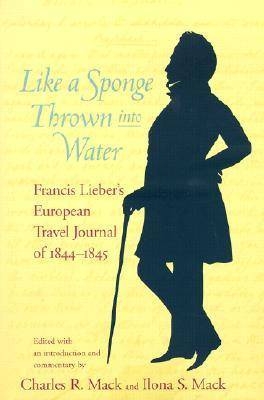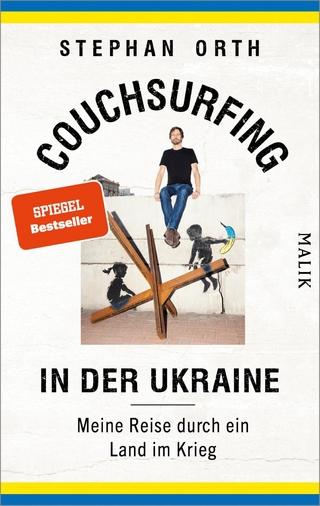
Like a Sponge Thrown into Water
Francis Lieber's European Travel Journal of 1844-1845
Seiten
2002
University of South Carolina Press (Verlag)
978-1-57003-447-3 (ISBN)
University of South Carolina Press (Verlag)
978-1-57003-447-3 (ISBN)
- Titel z.Zt. nicht lieferbar
- Versandkostenfrei
- Auch auf Rechnung
- Artikel merken
The USA's first political scientist, Francis Lieber was the founder of the Encyclopedia Americana, wrote the Civil War-era code of military conduct, and published works of significance in penology and political philosophy. This text is the travel journal he wrote during a return to Europe.
Ten glorious months in Europe with one of the nineteenth century's greatest thinkers; ""I live the life of a long dried sponge thrown into water,"" enthused the celebrated intellectual Francis Lieber (1798-1872) in a letter from Paris to his friend, the future Massachusetts senator Charles Sumner. In that letter, Lieber, a scholar well known on both sides of the Atlantic, described his joyous return to Europe in 1844 after two decades teaching and working in the United States. During his ten-month sabbatical, Lieber gloried in Europe's people, places, art, theater, and diversity. He not only wrote letters to his friends but also chronicled his travels in a diary. Lieber's previously unpublished account of these months, including passages translated from their original German, offers a fast-paced and exciting picture of the European culture and political milieu of the 1840s. The United States's first political scientist, the German-born Lieber was the founder of the Encyclopedia Americana, wrote the Civil War-era code of military conduct that has become the basis for modern war crimes trials, and published works of significance in the fields of penology and political philosophy while on the faculties at South Carolina College (the University of South Carolina) and Columbia University. Before immigrating to America, he fought against Napoleon at Waterloo and was forced to flee Prussia for espousing liberal political ideals. When he returned to Europe in 1844, Lieber's fame preceded him. In his journal he records meetings with such important individuals as the Duke of Wellington, Alexis de Tocqueville, Alexander von Humboldt, and King Friedrich Wilhelm IV of Prussia. His entries also reveal his connoisseur's eye for fine art, interest in judicial penal reform, and belief in the concept of nationhood. Editors Charles R. Mack and Ilona Mack present Lieber's journal with extensive contextual commentary, appendices, and an introduction to Lieber's adventurous life and lasting contributions.
Ten glorious months in Europe with one of the nineteenth century's greatest thinkers; ""I live the life of a long dried sponge thrown into water,"" enthused the celebrated intellectual Francis Lieber (1798-1872) in a letter from Paris to his friend, the future Massachusetts senator Charles Sumner. In that letter, Lieber, a scholar well known on both sides of the Atlantic, described his joyous return to Europe in 1844 after two decades teaching and working in the United States. During his ten-month sabbatical, Lieber gloried in Europe's people, places, art, theater, and diversity. He not only wrote letters to his friends but also chronicled his travels in a diary. Lieber's previously unpublished account of these months, including passages translated from their original German, offers a fast-paced and exciting picture of the European culture and political milieu of the 1840s. The United States's first political scientist, the German-born Lieber was the founder of the Encyclopedia Americana, wrote the Civil War-era code of military conduct that has become the basis for modern war crimes trials, and published works of significance in the fields of penology and political philosophy while on the faculties at South Carolina College (the University of South Carolina) and Columbia University. Before immigrating to America, he fought against Napoleon at Waterloo and was forced to flee Prussia for espousing liberal political ideals. When he returned to Europe in 1844, Lieber's fame preceded him. In his journal he records meetings with such important individuals as the Duke of Wellington, Alexis de Tocqueville, Alexander von Humboldt, and King Friedrich Wilhelm IV of Prussia. His entries also reveal his connoisseur's eye for fine art, interest in judicial penal reform, and belief in the concept of nationhood. Editors Charles R. Mack and Ilona Mack present Lieber's journal with extensive contextual commentary, appendices, and an introduction to Lieber's adventurous life and lasting contributions.
Charles R. Mack teaches art history at the University of South Carolina, where he is both a Louise Fry Scudder Professor of Liberal Arts and the William Joseph Todd Professor of the Italian Renaissance. Coeditor of The Roman Remains: John Izard Middleton's Visual Souvenirs of 1820-1823, he is the author of Pienza: The Creation of a Renaissance City and Paper Pleasures: Five Centuries of Drawings and Watercolors. Ilona S. Mack, like Francis Lieber, is a native of Berlin, Germany. She has collaborated with her husband on several published articles and museum exhibitions dealing with the Bunzlauer pottery tradition of eastern Germany and with the history of European decorated enamelwares. The Macks live in Columbia, South Carolina.
| Erscheint lt. Verlag | 1.7.2002 |
|---|---|
| Zusatzinfo | 4 halftones, 6 line art illustrations |
| Verlagsort | South Carolina |
| Sprache | englisch |
| Themenwelt | Reisen ► Reiseberichte ► Europa |
| ISBN-10 | 1-57003-447-8 / 1570034478 |
| ISBN-13 | 978-1-57003-447-3 / 9781570034473 |
| Zustand | Neuware |
| Haben Sie eine Frage zum Produkt? |
Mehr entdecken
aus dem Bereich
aus dem Bereich
10.000 Kilometer mit dem Rad am Eisernen Vorhang entlang vom …
Buch | Softcover (2023)
Verlag Voland & Quist
CHF 34,90
Eine Reise durch die Stadt der Lichter
Buch | Hardcover (2024)
Midas Collection (Verlag)
CHF 37,90
meine Reise durch ein Land im Krieg
Buch | Softcover (2024)
Malik (Verlag)
CHF 25,20


